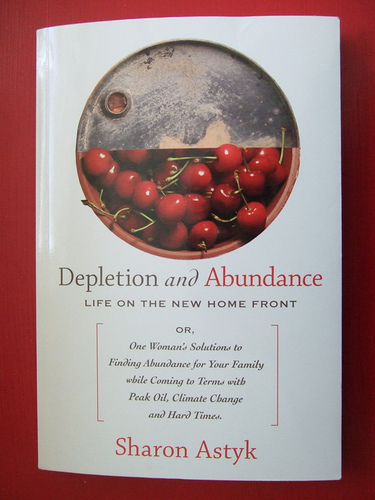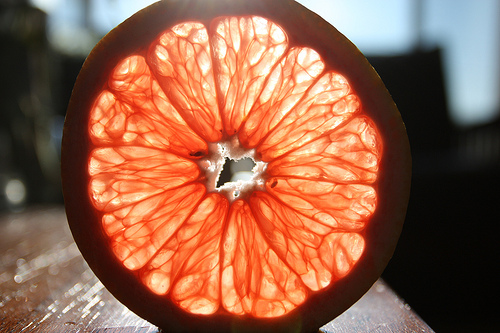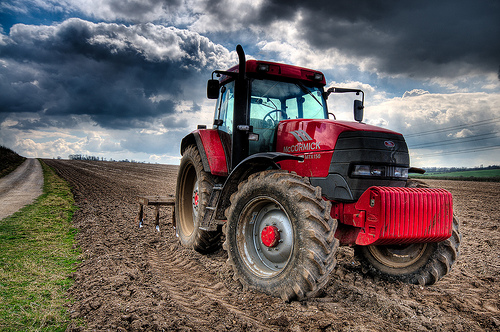Some cool benefits of eating organic images:
Depletion and Abundance: Life On The New Home Front

Image by Earthworm
When smart women liberate themselves from the mainstream life they were trained to aspire to and write about what they did instead, the rest of us benefit from a serious intellectual challenge to what is touted as progress. Formerly an academic in early modern literature, Sharon Astyk whose blog I’ve been enjoying, has brought to peak oil the much needed female perspective.
And what does that look like? Think Vandana Shiva meets Barbara Kingsolver meets the Tightwad Gazette. Sharon aligns herself with the powerdown philosophy first put forth by Richard Heinberg. She gives a convincing argument of why we are not going to save ourselves with renewable technology. But more than that. She firmly reminds us, in true Vandana Shiva style, that women have been doing most of the work of life so that others can participate in the "world" and make money off the formal economy. She provides a much needed reminder that the informal economy, that mostly takes place at home with making things and growing things and raising children, is going to be moving to the forefront of our lives when it comes to the post industrial life of post peak oil. And she does it by reclaiming this traditional sphere of women’s work from a feminist perspective.
This was important to me because she points out that we did not do the world a service by demeaning this work in order to liberate women. We just gave women the keys to the men’s room, so to speak, and left this rather important work to paid minority laborers and third world sweat shops. This, so that the second half of the population could then be shifted to the high octane life of dependency on manufactured goods and services. I never did buy that life, but living in the States you have to work hard not to participate in it. I had my third world upbringing to offer me another model, but Sharon has the harder task of prying loose the modern, convenience-run family from this dependency. She meets the challenge head on by tackling the many beliefs that without a high tech, high energy life we’d be back to eating insects. This is what I find so condescending about the assumptions of the first world, but through Sharon’s compassionate eyes I get a glimpse of what it’s like for a modern woman to weigh out the costs of this high octane life. Chapter by chapter she takes on the myths of our lives that have gotten all tied up in this dependency ie: education, health care, home maintenance and food growing and preparation. Her ideas are mind expanding in a way reminiscent of Ivan Illich, but with more home grown examples.
And by sharing her life in a country farmhouse, raising four boys, she shows what this domestic life would look like. I am gratified to watch her admonish her boys for insulting the food she serves them. She is a model for child raising that I have longed to see. Yet she humbly admits all her shortcomings while sharing what she is striving for. Her book is a lesson in becoming a responsible citizen. A manifesto for domestic self-reliance as she urges everyone to start a garden.
This brings to the peak oil community a different quality of discourse. It robs it of the thrill of big solutions, of high tech wonders or policies imparted by government decree. Local government plays a role, but mostly in changing codes that do not now allow the raising of livestock in your backyard. She brings the solutions down to what ordinary people can do locally. She even argues against the high expense of a solar powered home and suggests going more low tech. Thus her peak oil vision becomes one of frugality and old time homesteading technology, which begins to look a lot like a depression era America. (And I’m prompted to call on an octogenarian friend to ask her what that was like.) This vision also robs the peak oil thrill seeker of the satisfaction of seeing the world change in some dramatic way that will fundamentally affect the way we live. No we have been here before and it ain’t anything special. You can all go home now (and make do with what you have).
The promise of abundance given in her title derives from her satisfaction in a happier, simpler life. And people do respond to this message. The only thing missing for me is some kind of intellectual payback. I’m not much for doing something because it’s the right thing to do for my kids blah, blah, not having any. If it’s just going to be about duty and obligation where’s the fun in it? For me becoming self-reliant has always been about thumbing my nose at corporations by not buying into their crap and not having to work so hard to pay for it. (And not participating in their unethical rape of the world.) This may be the end of the line for me and peak oil as a framing device. Sharon has written the definitive book about living in a peak oil world and I have nothing more to add, but by grounding it so practically in everyday living preparations she also leaves me no political context in which to express this activity as a form of protest. Just surviving an unpleasant future is not enough. Sharon does mention that the opulent way we live robs others across the world of their share of resources, but this is not a book that galvanizes the political message of anti-globalization.
When a young East Asian man at the train station, saw this book in my hand, he expressed intense curiosity about it and I told him that it was about how diminishing resources would force us to live differently, more efficiently and frugally which would be good for us—especially Americans. So for a moment there we shared our third world perspective on the fallacy of the American lifestyle and I was able to offer him an alternative position to it. If this is how the book is received by Americans, then Sharon has done good.
Grapefruit Slice

Image by Dan Zen
Valley Farm, West Wratting

Image by Andrew Stawarz
Took a lunchtime recce to figure out how to get near to the new Camgrain grain silos I pass each day at West Wratting. Now to find a better vantage point of the gorgeous stainless steel grain storage towers.
As used in Slashfood’s article GreenDaily in 60 Seconds: Farms, food facts, and fishing.
Used in Enviroblog’s article on A farmer’s ‘come to Jesus’ moment
Used in ecosalon’s lifestyle article Farm Bill 101
Used in Local Forage’s article Organic vs. Sustainable
Used in Upturned Earth’s blog article Hey ho the dairy subsidy, the farmer on the dole.
Used in New Hampshire Public Radio’s article on The Dirt On Soil.
As used in The Style PA at Home’s blog article RECYCLING – Waste Used Wisely.
Used in the 2010 Biodiversity Indicators Partnership newsletter BIP/News and report on the Ecological Footprint.
Used in TechCrunch’s article Mel Karmazin Gives Away the Farm, Saves Job.
Used in GreenBiz.com’s article Farms’ Water Management a Key to Minimizing Drought: Report.
Used in Green Packs article Organic Farming, The Clean and Healthy Option?.
Featured in Mother Nature’s Network (MMN) article End o’ the week links: Energy.
Featured in Causecast’s article Organic vs Local? Who Cares. Neither is Sustainable.
Featured in Med Minded’s article Does Organic Food = Better World?
Featured in the Mom Squad Blog article Celebrate Spring!.
Featured in cafébabel.com’s article Sale via internet: end of middle man for agricultural products.
Featured in Public Radio Kitchen’s article
How Farmers Are Faring, Part I.
Featured in Science Buzz’s article Agribusiness saves the planet!.
Used in the BNet article Ethanol Industry Squeezes an Otherwise Profitable Farmer Mac.
Used in Headlines from Floyd’s blog article Bet the Farm on Email.
Used in The Takeaway’s article Old MacDonald Had An Intern.
Used in the Lorenzo article The Chinese and Arabs are buying poor countries’ farms on a colossal scale. Be wary of the results.
Used in A Clean Life’s blog article This Week in Links – Greenerize
Currently used as Eat Less Meats’s Twitter avatar.
Featured in Deutsch-Japanische Jugendgesellschaft e.V. module C5: Sustainability from the producing and consuming point of view
Used in The Widman Blob article Too Little Farming.
Used in The Happy Rock’s piece Is Capitalism Always The Answer?.
Used in The Atlantic’s article How to Feed the World.
Used in Philip’s Blue blog article Book Review: ‘Guns, Germs and Steel,’ by Jared Diamond.
Used in the slide deck An Ecosystem Approach To Social Media.
Used in Mother Earth News By Tackling Climate Change, United States Could Gain 4.5 Million Jobs by 2030.
Used in Polon’s piece Organic language: marketers should promote wider benefits.
Used in Lauren’s National & State Parks Blog piece Try Your Hand at Farming at Cuyahoga Valley National Park.
Used in the Mother Nature Network piece Blog Action Day 2009: Climate change.
Used by Geography All The Way in their KS3 sectionEconomic Activities.
Used in the Daily Bread and Butter’s piece Agriculture reform’s latest foe – Bread & Butter.
Used in the Urban Workbench piece Preparedness and Possibilities.
Used in the cyberpop article from FarmVille to the Classroom.
Used on the Sidney Eve Matrix piece pedagogy inspired by Farmville.
Used in Financial News Express’ piece Agricultural Economic News February 19, 2010.
Used in the the Energy Collective’s article Breaking Down the Obama Biofuel Plan.
Used in Rightous Marketing’s piece Is There A Better Way?.
Used in Mother Earth News’ piece By Tackling Climate Change, United States Could Gain 4.5 Million Jobs by 2030.
Used in metablog’s piece “In Defense of Food” – Part 2 – Nutritionalism.
Used in TechCrunch’s article Will AOL and Demand Media’s Content Farm Strategy Prevail?.
Use in Eat.Drink…Better.’s piece Is RoundUp Killing the Soil?
Used in the Folks Gotta Eat piece Wait, isn’t Walmart the devil?.
Used in onextrapixel’s piece A Designer and Developer’s Dilemma: 9 Detestable “Requests”.
Used in EarthSky’s piece Sean Smukler: First steps in feeding 9 billion.
